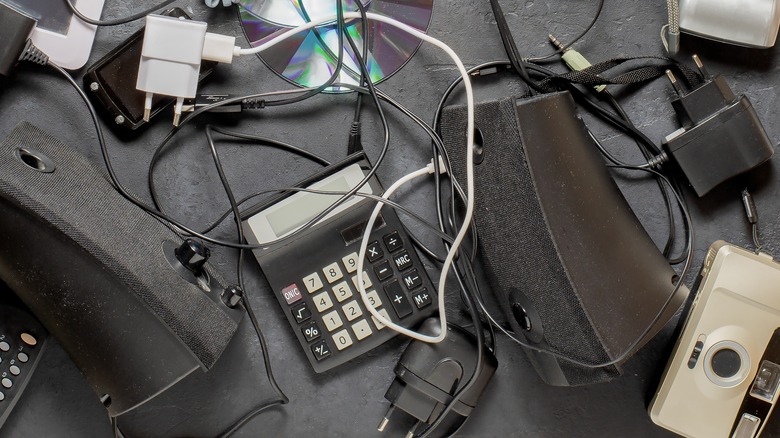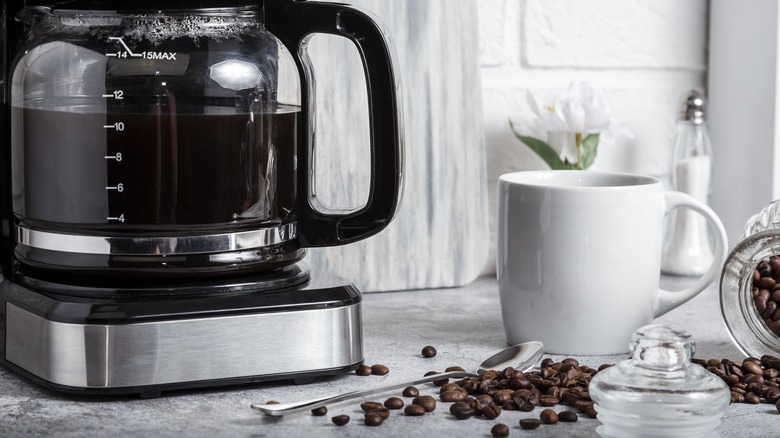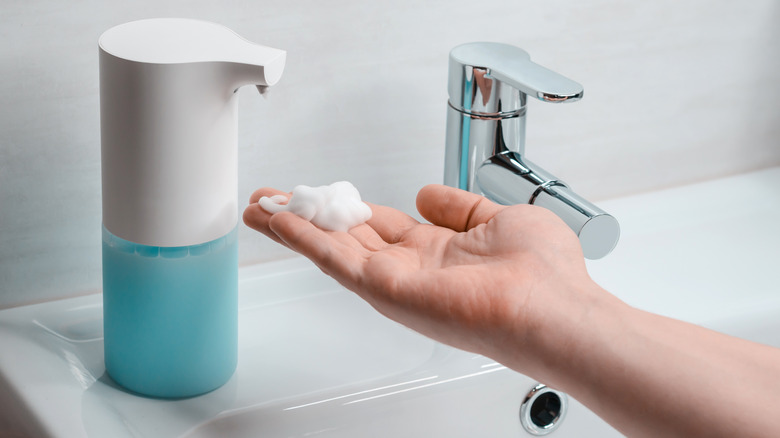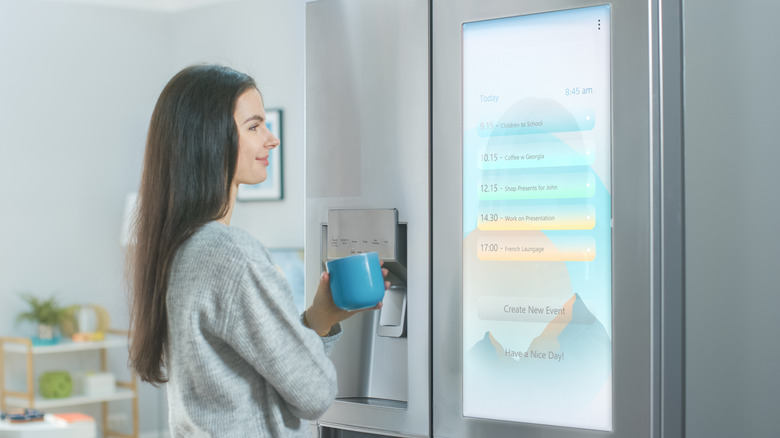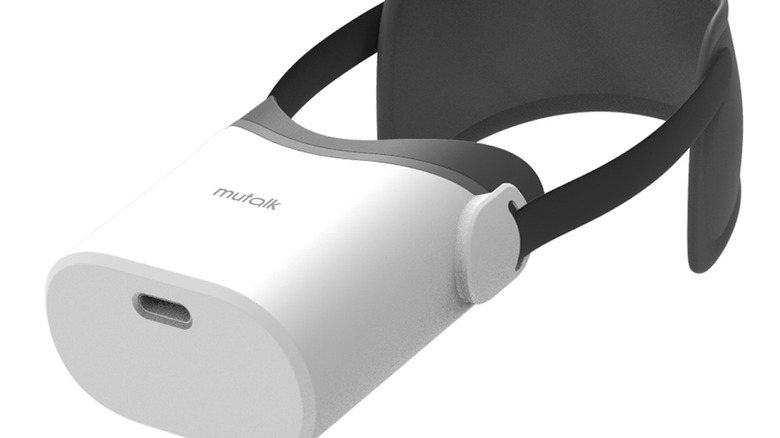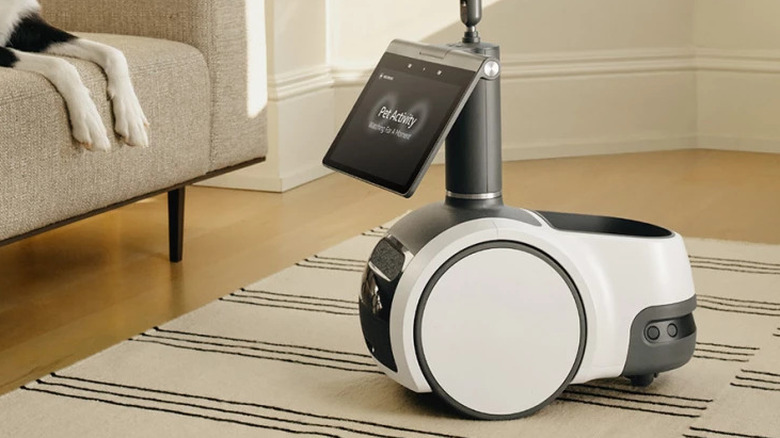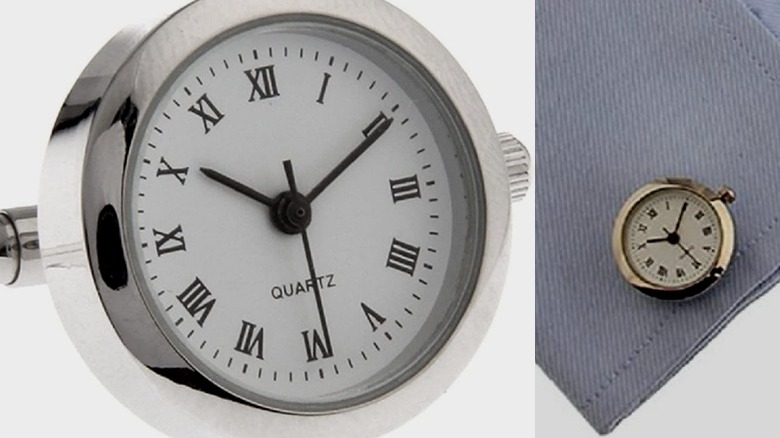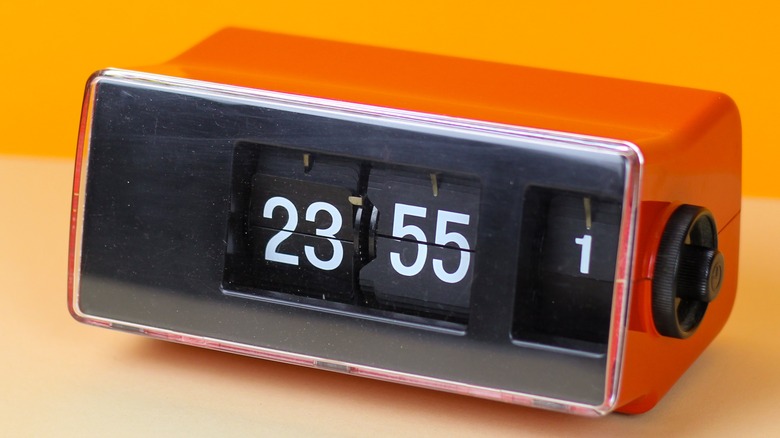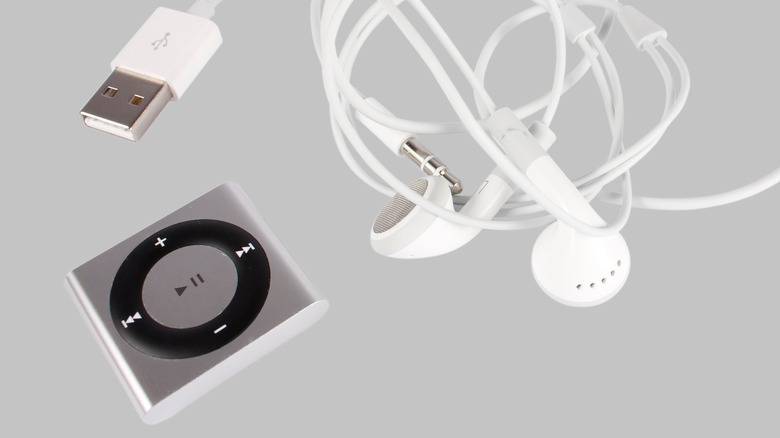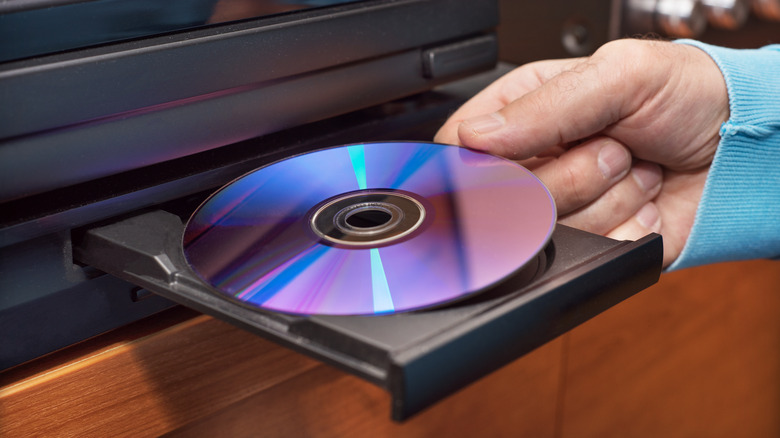12 Tech Gadgets That Are A Total Waste Of Money
We may receive a commission on purchases made from links.
While most tech gadgets are there to enhance our lives, others are a bit more pointless. Tech can fall into the "utter waste of time" category for a couple of reasons. It may have been a great idea, or a solid gadget, at one point in time — but advances elsewhere mean it isn't really worth using anymore. Obsolescence is pretty forgivable. However, there are also inventions that were never that good, to begin with.
A truly innovative piece of tech should enhance its user's life in some way, perform a task very well, or at least make things a little easier. Unfortunately, for every good idea, there is a load of bad ideas. A bad gadget is there to solve a problem no one has or answer a question nobody ever asked. They may be expensive, and in some cases, they could even make a simple task harder or more convoluted.
Good examples of this are the Juicero — which was purely designed to squeeze a pack of overpriced juice into a cup. It needed WiFi for this, and the packs had a QR code in place to prevent people from using a cheaper alternative. There was also a thing called Smalt, which was a smart salt shaker that was also capable of doubling as a Bluetooth speaker. There is no universe where setting an amount of salt and a specific grind on an app will be more convenient than just twisting the top of a mechanical salt grinder. Both of these products are thankfully dead, but plenty of useless tech gadgets still remain available for those that wish to participate in money wasting. Some of these devices have even been around for a while and found a good amount of success.
Automatic coffee machines
Automatic coffee machines have been around for a very long time. The idea behind them is quite simple too. You load up the coffee machine, set the timer for around the same time as when you wake up, then marvel at the fact you're waking up to freshly brewed coffee every morning. You can even get coffee machines that work with smart home assistants like Amazon Alexa.
Unfortunately, they do have their downsides, and if you're a true coffee snob, they aren't really worth the extra cash. The way an automatic coffee machine works can have a massive impact on the quality of coffee you're getting. Usually, people that use them will load the machine up with grounds the night before. Unfortunately, the machine isn't airtight, and letting ground coffee sit in it for several hours will make the grounds go stale.
It gets even worse with the smart home-ready coffee makers, as you'll either have to keep them locked and loaded at all times or the smart home function will be utterly pointless. On top of everything else, you're still putting the same amount of effort into each pot of coffee. You're still grinding some beans and loading them into a machine, then adding water. There's just a delay between you doing that and the payoff. It's worth noting that you can buy machines that you load whole beans into. The machine will grind the beans for you before it brews, resulting in a higher quality cup of coffee. But these tend to be more expensive and you still need to add water and a fresh filter every time and then clean it out afterward. Just get a Keurig or a regular drip coffee maker.
Hands-free soap dispensers
This may actually be the most pointless gadget ever created. You can sort of understand the logic, especially after the precautions that people began to take during the coronavirus pandemic. Bathrooms tend to be covered in germs, so the fewer surfaces you touch, the better. A hands-free soap dispenser removes the need to touch one of those surfaces. Wave your hand in front of a sensor, and a measure of liquid soap will be squirted into it.
The problem is, a soap dispenser is the last thing on earth that needs to be hands-free. Every time you use it, you're going to be washing your hands immediately afterward. If you got something very unpleasant on your hands, you'd wash them in response. So it doesn't matter what germs are on a standard soap dispenser, as they're going to be cleaned away from the hands of any person that touches them using the contents of the dispenser.
To make matters worse, a hands-free water tap would actually be useful as you do touch that after washing your hands. Unfortunately, that's a bit more complex to install, so people are far less likely to have one. Either way, avoid this ridiculously and utterly useless bathroom gadget.
Smart Fridges
Smart homes take many forms. Some people are happy with a home assistant and a few lightbulbs, while others try to cram a smart device into every corner of their home. Smart fridges are one of the more expensive options, often retailing for several thousand dollars. For the money, you'll get a fridge that can play music, suggest recipes, and display digital art because pinning a five-year-old's physical scribble to a fridge with a magnet is just so 20th century.
Unfortunately, a smart fridge is a bad investment and that isn't just because of the increased costs for features you don't actually need. A smart fridge could actually lead to major smart home security issues a few years down the line — so you're really paying a premium to compromise your home's cyber security. This problem occurs because of a fridge's lifespan. The large, expensive appliance should last at least a decade, with many fridges lasting even longer. It's also not likely to be something people will replace before they need to.
Cybersecurity on the other hand is a constant battle, which is why you see everything updating so often. Usually, updates are only made available for devices under a certain age. Most electrical devices only last a fraction of a fridge's lifespan, so this isn't a problem. But your smart fridge will likely hit a point where the manufacturer is no longer supporting it with updates or where its hardware is incapable of running current software. This will create a vulnerability hackers could exploit. Save yourself the trouble, and a few hundred dollars, by buying a normal fridge.
The Mutalk
It's 2023, and virtual reality (VR) is absolutely brilliant. You can pick up a standalone headset for not much money at all, and throw yourself into an entirely different world. You can spend your time fighting off zombies in "The Walking Dead," or you can do something relaxing, like fishing on a riverbank. While the headsets are cheap and remarkably functional, accessories that have been designed to go with the headsets are very hit-and-miss. There are golf club handles that can send your controller flying through the TV, full-body tracking sensors that don't really work yet, and boxing gloves designed to protect your hands when you inevitably swing a haymaker into a wall or a doorframe.
Some VR accessories are just downright weird. One of those is the Mutalk. It's designed to make the social side of VR gaming less obnoxious for people around you in the real world. You strap the Mutalk to your mouth and it will act as both a microphone and a sound muffler, so your conversations stay between you and whatever weird creatures you're chatting with in the Metaverse.
Issues with this product begin with the look — this device turns the already unappealing visage of a person wearing a VR headset and makes it worse. This device is made to act like a muffler for your mouth — a gag, more or less. Imagine the contents of this device — the air coming out of your lungs has a high moisture content, you can see this every time you breathe on a window. Containing that warm, moist, air in what is essentially a foam-lined box sounds like a great way to cultivate a lot of foul-smelling bacteria in a short space of time.
Amazon Astro
A combination of functionality and devices that are likely sold at a loss have led to Amazon's Alexa becoming an incredibly popular voice assistant. Add in Amazon's knowledge of your shopping habits, and the retail giant likely knows an awful lot about you. But if you would like Jeff Bezos' book company to know even more about your home and daily life, consider getting Amazon Astro — the creepy, expensive, robot thing that was unveiled back in 2021.
So why is getting an Astro an awful idea? Well, it's a massive privacy threat for a start. The thing is equipped with a bunch of microphones and cameras, and it has the freedom to wander around a large area of your home. It requires all kinds of permissions to function, saves a database of people's faces, and is vulnerable to cyber-attacks.
On top of all that, the thing is largely useless. At least a Roomba tidies up a bit. Astro just acts as a rolling security camera/notification device. It can't directly interact with anything. Some of the promotional materials show Astro bringing its owner a beer, but someone has to place the beer in Astro for that to work. Considering it can't climb stairs either, you may as well either get the beer yourself or have whoever is near the fridge walk a few feet and bring the beer to you. We may have robot butlers of some kind in a few years, maybe the Tesla Bot will fulfill that dream, but Astro isn't a step in the right direction.
Haptilabs Hapifork
Losing weight can be a struggle, so if there's a product out there that can help, it's naturally going to peak a lot of people's interest. Unfortunately, the diet industry is also filled with useless, gimmicky products and medicines that fall squarely within the "snake oil" category. Amongst these useless products is the Hapifork, which is designed to reduce the number of calories you consume by making you slow down while you're eating.
The Hapifork's main method of making you eat less involves vibrating, though it also has indicator lights that will alert you to the fact you're eating too quickly. It's based on the idea that most people feel satiated after eating for 20 minutes, so if it can reduce the amount you consume within that time frame you'll fill up and eat less overall.
The fork also tracks how many fork-sized servings you've consumed each minute, the time between fork-sized servings, and the time it took to eat the meal overall. This is then recorded on the product's database, and shown on the brand's website or app. This Bluetooth-enabled, shaky, snack-reducing utensil costs $99.
Clock Cufflinks
People don't dress anywhere near as formally as they used to, and many men may not even own a shirt that requires something like cufflinks. But being something that isn't used often doesn't necessarily make a gadget bad. There are many tools and objects that rarely come out of storage but pull their weight when they do. These particular cufflinks aren't one of those objects.
Not only are they unlikely to be used very often, but their gimmick is also one that another object does far better. For some indiscernible reason, MrCuff (as seen on Amazon) has decided to build little quartz clocks into a pair of cufflinks. You can check the time on them by glancing at your wrist. While you're looking at your wrist, you may also notice a watch on it. This also tells the time and probably looks far less ridiculous.
Dress watches are also a thing, and are one of the few pieces of jewelry men traditionally wear in a formal setting. So if you're going to an event that merits a pair of cufflinks, you should also pick out a nice watch and swerve these things entirely.
Plug-in alarm clocks
Alarm clocks have been around in some form since the 18th century, and the chances are you'll still need something that will reliably wake you up in the morning in this day and age. But a dedicated alarm clock, like the one you may already have on your bedside, would be a total waste of money to purchase anew in 2023.
There's nothing wrong with the alarm clock's function, it's just that other objects you probably already own do the same job just as well. Even the most basic cellphone has an alarm function, and unlike a plug-in alarm clock (without a battery backup) it isn't affected by power outages. It's also far more portable than a traditional alarm clock, so you can take it traveling with you. As far as fixed alarms go, home assistants like Google Home and Amazon Alexa have alarm functionality. Simply tell the assistant what time you want to be woken up and the alarm is set. You can also set multiple alarms with all of these devices, which is handy if you're prone to sleeping through.
MP3 players
The modern smartphone is a marvelous thing. Beyond its texting and calling abilities, it can serve a seemingly limitless amount of functions. While you may try to justify having dedicated devices in order to save storage on your phone, reduce the drain on its battery life, or just because you're used to it that way, there really isn't any need to take up extra pocket space with something like an MP3 player.
MP3 players get hit in two departments. Firstly, your phone likely has plenty of internal storage and you can fill that with music. Some phones are also capable of expanding that storage with a micro SD card, though flagship models like the Samsung Galaxy S range have long since dropped this option. If you want to save your storage, there's also streaming to contend with.
Tidal, Amazon Music, Spotify, or any of the other countless services on offer have hundreds of thousands of tracks to select from. You can even save your favorites and listen to them offline. Yes, you may be caught with no signal and unable to stream, and maybe you avoided downloading any tracks. In this case, you will probably go without music. But the inconvenience of keeping another device on you, making sure it's charged, and keeping the music on it in line with your current tastes outweighs the small chance it has of stepping in to save the day every once in a blue moon.
Dedicated DVD/Blu-ray players
There are people in this world who have a thing for physical media. Although media licensing laws mean you don't actually own what's on the disk, it can still feel more tangible than a purely "digital" copy. The physical media lovers in your life will also heartlessly chuckle at you whenever the internet goes down on movie night, or your preferred streaming service decides to get rid of your favorite show. Their DVD collection is eternal and untouchable.
If you want to start your own DVD collection, go right ahead. Just don't buy a dedicated device to play them on, it's a massive waste of time. If you've purchased a laptop in recent times, it likely won't have a DVD drive as they're seen as a waste of space by most manufacturers. But the last several generations of major-brand gaming consoles still have one, provided you haven't decided to save an extra $50 by going for the digital-only version.
You're better off grabbing one of the several generations of Xbox or PlayStation that have DVD and Blu-ray capabilities. A used PlayStation 3 (PS3) or Xbox One could cost you around the same amount of cash as a similarly-capable Blu-ray player — and the Xbox or PlayStation gives you access to streaming services and games, too. You can also get all of the benefits of "physical media" without having to dedicate an entire wall of your house to storing it.
You can buy and download digital copies of your favorite films, and store them on a portable HDD or SSD. Most modern TVs and projectors have a USB port the drive will plug right into, and you won't have to give up a bunch of space or risk Netflix removing a show you're halfway through watching.
Digital point-and-shoot cameras
If you're old enough to remember the early 2000s or browse some pictures from around then, you might notice a trend. Small digital cameras were all the rage. Just to be clear, we're not talking about digital SLRs here. Those are a different beast entirely, though they are themselves being challenged by a different technological advancement. We're talking about the small, portable, cameras that didn't cost much or require much photography knowledge to use. Phone cameras were also a thing in those days, but they were a relatively new addition to a rapidly evolving cell phone market. As a result, early phone camera quality was absolutely awful — even on higher-end models.
Most digital cameras weren't particularly great themselves. Something like a FujiFilm FinePix F70EXR is a higher-end model from later on in the digital camera golden age, and it's less powerful than the selfie camera on a modern mid-range smartphone. Compared to your average point-and-shoot digital camera, most any major brand smartphone likely has better quality cameras, connectivity, display, control, and easier transfer options. Selfies, one of the most common hobby photo types, are a lot easier to capture with a smartphone.
USB flash drives
Flash drives have some obvious benefits. They're absolutely "unhackable" most of the time, as they aren't connected to a network. They're relatively cheap, they're extremely portable, and there are plenty of options with large amounts of storage capacity. So why are they a waste of money?
Most of the time, your flash drive isn't transporting sensitive data you're worried might fall into the wrong hands. Truly sensitive things, like digital currencies, have their own specialist devices they can live on. The cheap and cheerful flash drives we all know and love will usually have something like a PowerPoint presentation, some vacation photos, or a college paper on them. For a wide variety of purposes, you needn't go buy a brand-new USB flash drive.
There's such an abundance of these devices out in the wild today that there's little reason for you to pay more than a few bucks to attain one. Your local thrift shop likely has a whole bucket full of them. Check a relative's junk drawer, head out to your local garage sale, boot sale, or estate sale, and you'll find flash drives of all shapes and sizes for dirt cheap. Of course, you should also be wary of the old USB killer drive trap – remember to check your drives before you wreck your drives!
